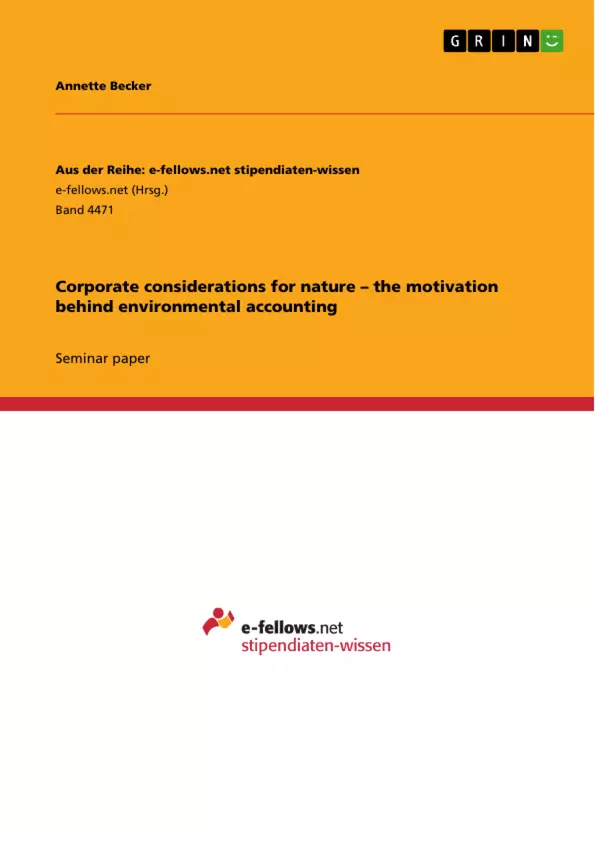The tendency to show environmental commitment in economic sciences has been growing during the last decades. Terms like green, ecological or environmental economics have been promoted, most famously in the first green wave, when the book “The Limits to Growth” in 1972 and the Brundtland Report “Our Common Future” in 1987, and more recently, when the Stern Review on the Economics of Climate Change in 2006 and the Fifth Assessment Report of the Intergovernmental Panel on Climate Change (IPCC) in 2013, were published.
But how come the business world started to care about the environment in the past, without any comprehensive standard forcing them to do so legally on a national or global level? It has been felt that the financial accounting framework was not adequate to provide the information required by various internal and external stakeholders on environmental costs and liabilities, and steps taken by companies to mitigate global warming (Idowu et al. 2013, p. 1035). The endeavour was that the complete costs incurred by an enterprise including external, environmental costs like consumption of non-renewable resources, damages to the environment and degradation of nature, ought to be considered. These external costs, which are also called externalities or societal costs, are caused by the impact of organizational activities, products and services on natural environmental resources and society, but for which the organization doesn’t bear any financial liability. In other words, “external costs result from corporate activities but are not internalized through regulations and prices. The boundaries of these costs are not static.” (ibid. p. 1035).
Inhaltsverzeichnis (Table of Contents)
- Introduction
- Economics, business and externalities
- Corporate considerations
- Environmental accounting
- Environmental management accounting
- Business case PUMA
- PUMA's Environmental Profit & Loss account
- PUMA's environmental impacts and E P&L results
- Critical review
- Theoretical framework: The relationship between the corporation and society
- Background theories
- Legitimacy theory
- Stakeholder theory
- Critical review
- Reflection
Zielsetzung und Themenschwerpunkte (Objectives and Key Themes)
This paper aims to explore the motivations behind environmental accounting in corporate settings and to analyze the role of environmental accounting in helping businesses achieve sustainability goals. The paper examines the concept of externalities, which refer to the costs imposed on society by business activities but not reflected in market prices.
- The growing importance of environmental considerations in business practices
- The limitations of traditional accounting models in capturing environmental costs and liabilities
- The development and implementation of environmental accounting frameworks
- The relationship between the corporation and society in the context of environmental responsibility
- The role of various stakeholders in shaping corporate environmental practices
Zusammenfassung der Kapitel (Chapter Summaries)
- Introduction: This chapter introduces the concept of externalities, discussing how the business world started to consider environmental issues in the past. It delves into the inadequacy of traditional accounting frameworks in providing information on environmental costs and liabilities. The chapter emphasizes the importance of incorporating external costs, often neglected, into business decision-making.
- Business case PUMA: This chapter explores PUMA's Environmental Profit & Loss account as a case study. It examines PUMA's environmental impacts, the results of its environmental P&L, and provides a critical review of its approach.
- Theoretical framework: The relationship between the corporation and society: This chapter delves into the theoretical foundations of corporate responsibility towards the environment. It examines theories such as legitimacy theory and stakeholder theory, analyzing how they influence the relationship between corporations and society.
Schlüsselwörter (Keywords)
The key themes and concepts of this work center around environmental accounting, externalities, corporate social responsibility, stakeholder theory, legitimacy theory, and the relationship between business and society. The text explores how businesses are incorporating environmental considerations into their decision-making processes and accounting frameworks, highlighting the importance of transparent and comprehensive environmental reporting.
Frequently Asked Questions
What is environmental accounting?
Environmental accounting is a framework that incorporates environmental costs and liabilities—often ignored in traditional accounting—into a company's financial reporting.
What are "externalities" in business?
Externalities are societal costs, such as pollution or resource depletion, caused by corporate activities but not reflected in the organization's financial liability or product prices.
What is PUMA's Environmental Profit & Loss (E P&L) account?
PUMA's E P&L is a pioneering case study that assigns a monetary value to the environmental impact of its entire supply chain, making these "invisible" costs visible.
How do stakeholder and legitimacy theories relate to the environment?
Legitimacy theory suggests companies act sustainably to meet societal expectations, while stakeholder theory argues that businesses must account for the interests of everyone affected by their environmental footprint.
Why is traditional financial accounting inadequate for sustainability?
Traditional frameworks fail to provide information on long-term environmental liabilities and the consumption of non-renewable resources, which are crucial for assessing true sustainability.
- Citation du texte
- Annette Becker (Auteur), 2013, Corporate considerations for nature – the motivation behind environmental accounting, Munich, GRIN Verlag, https://www.grin.com/document/264163



